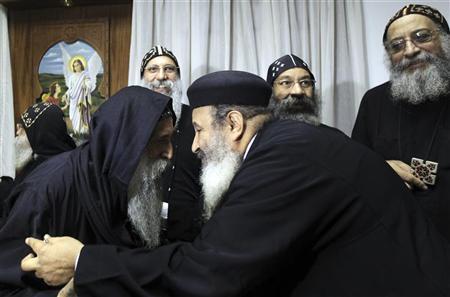By Yasmine Saleh
CAIRO (Reuters) – A vote to help choose a pope for Egypt’s Coptic Orthodox church began on Monday in a process the minority Christians hope will deliver a leader to guide them safely through the upheaval of the Arab Spring.

The previous incumbent, Pope Shenouda III, had led the church for four decades until his death in March at the age of 88. His successor will assume the post in a fast-changing Egypt where long oppressed Islamists are now in power – a major shift that is a source of alarm for the minority Christian community.
About 2,400 people have the right to vote in Monday’s ballot and must pick from a shortlist announced by the church on October 13 and which comprises two bishops and three monks aged between 49 and 70.
Picked by the church, the voters include leading members of the church, public figures and a handful of representatives of the Ethiopian Church, which has historic links to the church in Egypt.
The three most popular candidates go forward to the November 4 draw which, according to an ancient tradition, will be carried out by a child who must be blindfolded. The new pope will be the 118th to lead the Coptic Church.
“We are all so worried from the situation in Egypt now and the rise of Islamists to power but the church has always been harassed,” said Magdy Helmi, a 53-year old voting as a representative of a provincial branch of the Coptic Church. “The church became an expert in surviving bad times,” he added.
The Muslim Brotherhood, the mainstream Islamist movement that propelled President Mohamed Mursi to power, has sworn to guard the rights of Christians in the overwhelmingly majority Sunni Muslim country of 83 million people.
Monday’s voting took place at a cathedral complex in Cairo’s Abbasiya district. Bearded priests in black robes queued up to post their ballot papers into transparent boxes. The result was expected late on Monday.
“I hope that whoever wins will have the patience and wisdom of Pope Shenouda as times are tough on both Christians and Muslims – on all Egyptians,” said Sameh Nazeh, a 39-year old Copt who was waiting for his wife – one of the voters – to cast her ballot.





